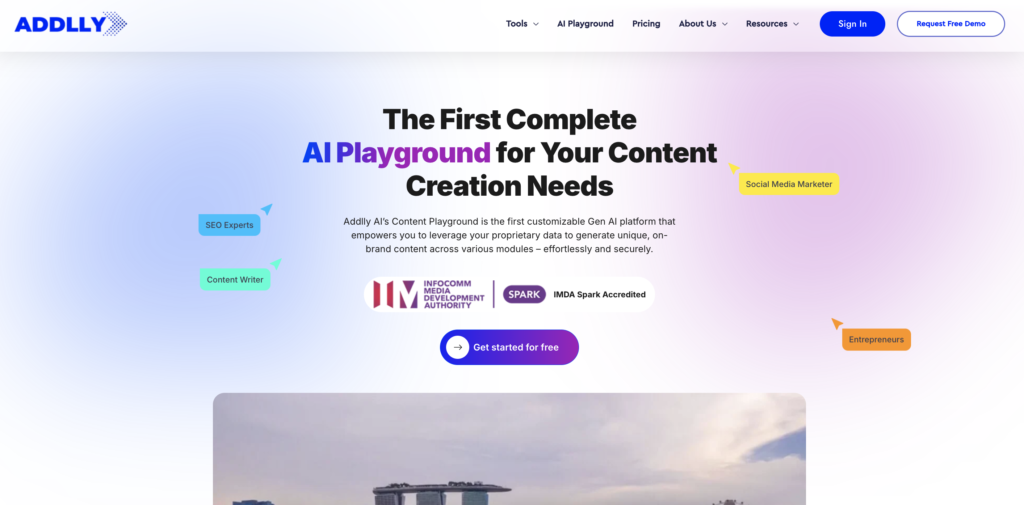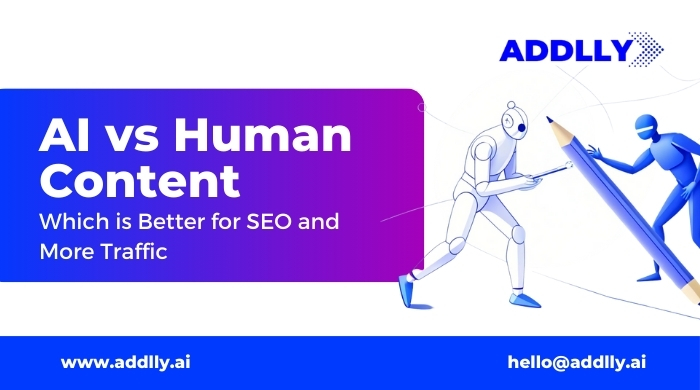AI vs Human Content—which one is better for SEO and getting more traffic? With artificial intelligence getting smarter, many businesses are wondering if they should use AI or human writers to create their content. Both options have their good and bad sides, and choosing between them can have a big impact on your website’s visibility and how much people engage with your content.
In this article, we’ll look at the main differences between AI and human content, see how well each one works for SEO, and find out how they can affect your website’s traffic. Whether you’re a marketer, a business owner, or just interested in content creation, this guide will help you figure out which method is better for getting clicks and building a loyal audience. Let’s dive into the details and see which option can make your content stand out.
Quick Summary Powered by Addlly AI
ToggleWhat is AI Content?
AI content refers to text generated by artificial intelligence algorithms and machine learning models. These tools, such as OpenAI’s ChatGPT and Google’s Bard, can produce various types of written content, including articles, blog posts, product descriptions, and more, in a matter of seconds. This capability has revolutionized content creation, offering both advantages and disadvantages compared to human-generated content.
Pros of AI Content
- Speed: AI can produce content quickly. Need a blog post in 10 minutes? AI can do it.
- Cost-Effective: Hiring a human writer can be expensive. AI tools often come at a lower cost, making them attractive for businesses on a budget.
- Scalability: AI can generate large volumes of content, helping websites fill their content calendars without much effort.
Cons of AI Content
- Lack of Creativity: AI can struggle with creativity and originality. It often produces generic content that may not resonate with readers.
- Engagement Issues: Content written by AI may not engage readers as effectively as human-written content. This can lead to higher bounce rates.
- SEO Limitations: While AI can optimize for keywords, it may not understand context or nuance, which can impact SEO performance.
You can read more about the pros and cons of AI generated content in this article.
What is Human Content?
Human content refers to text, images, videos, and other forms of media created entirely by humans. This type of content is crafted with the intention of communicating specific messages, ideas, or emotions, and it often reflects the unique perspectives, creativity, and experiences of its creators.
Pros of Human Content
- Creativity and Originality: Human writers can craft unique stories and ideas that resonate with readers, aligning with the Google E-E-A-T guidelines for high-quality content.
- Engagement: Content written by humans tends to engage readers more effectively, leading to longer time spent on pages and lower bounce rates.
- SEO Benefits: Human writers often understand their audience better, which can lead to higher-quality content that performs well in search engines,
Cons of Human Content
- Time-Consuming: Writing high-quality content takes time. It’s not as quick as generating AI content.
- Cost: Hiring skilled writers can be expensive, especially for larger projects or ongoing content needs.
AI vs Human Content: Detailed Comparison
| Aspect | AI Content | Human Content |
|---|---|---|
| Speed | Generates content quickly, often within minutes | Takes longer to produce, requiring hours or days for high-quality content |
| Cost | Generally more cost-effective, with lower ongoing costs after setup | Higher costs due to labor and expertise required |
| Scalability | Easily scalable, can produce large volumes of content rapidly | Limited by human capacity, harder to scale quickly |
| Creativity | Often lacks creativity and originality, producing generic content | High creativity and originality, offering unique insights and storytelling |
| Engagement | May not engage readers as effectively, leading to higher bounce rates | Higher engagement rates, better emotional connection with readers |
| Accuracy | Can include inaccuracies, requiring human oversight | Generally more accurate and reliable, with fact-checking and editing |
| SEO Optimization | Can optimize for keywords but may not keep up with latest SEO practices[ | Better at staying updated with SEO best practices, improving rankings |
| Consistency | Ensures consistent tone and style across content[10][11]. | Quality can vary depending on the writer’s expertise[21][30]. |
| Emotional Connection | Lacks the ability to create content that resonates emotionally[7][35]. | Can tap into emotions and empathy, fostering trust and loyalty[12][25]. |
| Adaptability | Limited in understanding context and cultural nuances[16][19]. | Highly adaptable, understanding context and nuances effectively[16][19]. |
AI-generated content and human-created content each have distinct advantages and disadvantages when it comes to SEO and driving traffic. Here’s a detailed comparison based on recent findings.
Speed and Efficiency
- AI Content: AI can produce articles significantly faster than humans, often completing a piece in about 16 minutes compared to 69 minutes for a human writer. This efficiency can be beneficial for businesses needing large volumes of content quickly.
- Human Content: Although slower, human-generated content tends to require less editing and often maintains better quality, leading to more consistent long-term traffic growth
Quality and Engagement
- Human Content: Studies show that human-authored content outperforms AI in keyword rankings and web traffic. It provides deeper emotional resonance, creativity, and authenticity, which are crucial for engaging audiences. Human writers can offer unique perspectives and narratives that AI struggles to replicate
- AI Content: While AI excels in producing technically correct information quickly, it often lacks the nuance, depth, and personal touch that resonate with readers. This can lead to lower engagement rates compared to human-generated content.
SEO Performance
- Human Content: According to Neil Patel, human-written articles achieve higher keyword rankings and attract more organic traffic over time. They are perceived as more trustworthy, likely due to their originality and emotional depth.
- AI Content: Although it can be optimized for search engines, AI-generated content has shown fluctuating performance in rankings and traffic. Its ability to maintain consistent visibility is often inferior to that of human-authored content.
Cost-Effectiveness
- AI Content: Generally more cost-effective due to lower operational costs associated with speed and scalability. This makes it attractive for businesses looking to maximize output while minimizing expenses
- Human Content: While more expensive in terms of time and resources, the investment tends to pay off through better engagement, higher traffic, and improved SEO outcomes in the long run
The Best of Both Worlds: Combining AI and Human Content
Instead of choosing one over the other, consider a hybrid approach:
- Use AI for Research: Let AI help you gather data, generate ideas, or create outlines.
- Draft with AI: Use AI to create a first draft, saving time and effort.
- Edit and Enhance with Humans: Have human writers refine the AI-generated content, adding creativity, depth, and a personal touch.
How Addlly AI Can Help?

Addlly AI is a powerful content creation platform designed to streamline your content production process with advanced AI tools.
Whether you need a 1 Click Blog Writer or AI newsletter generator, Addlly.ai offers tailored solutions that allow you to save time while producing high-quality content.
The platform also features a Shopify AI Writer App for businesses on Shopify, an AI social media post generator, and more, ensuring that you can create valuable content efficiently. With its mix of AI and human style of writing, Addlly.ai helps you maintain the human element in your content, offering a balanced approach that increases engagement and boosts SEO performance.
This combination makes Addlly AI an essential tool for businesses looking to scale their content efforts while maintaining quality and authenticity.
What To Expect from AI Content Writing Tools?
As AI content creation tools evolve, you can expect them to become even more sophisticated in delivering high-quality, engaging, SEO friendly content. These tools are designed to generate content quickly, making them ideal for businesses that need to scale their content production.
A major trend in the next decade will be the mix of AI and human efforts, where AI handles the content generation while human writers add creativity and personal touch.
If you’re looking for Jasper AI alternatives or Writesonic alternatives, Addlly AI stands out as a good option. It offers the best of both worlds – seamlessly integrating AI with the human elements to produce content that’s not only SEO-friendly but also resonates emotionally with readers.
Addlly AI keeps up with the latest AI trends, ensuring your content is always relevant and impactful. By choosing Addlly AI, you’re opting for the best AI content creation tool, designed to meet your needs both now and in the future.
Final Words
In the evolving world of content creation, finding the right balance between AI and human is important. AI-generated content offers speed and scalability, while human writing adds in creativity, emotional connection, reliability, and authenticity. AI tools like Addlly AI bridge this gap by combining the strengths of both AI and human expertise, ensuring high-quality content that resonates with audiences.
The future of content creation will likely involve a mix of AI and human efforts, combining the strengths of both to produce content that is both efficient and impactful. As we move forward, understanding the advantages and limitations of each approach will be key to successful content strategies.
FAQs – AI vs Human Content
How does AI content differ from human content?
AI content is generated using algorithms that analyze existing data to create text, while human content is created by individuals who bring creativity, emotional depth, and personal experiences. AI can quickly produce large volumes of content, but it often lacks tone and originality that human writers provide, making human content more engaging and relatable.
Is AI content reliable for SEO?
AI content can be reliable for SEO when it’s properly optimized with relevant keywords and structured well. However, it may require human oversight to ensure accuracy, context, and quality. While AI can help in generating SEO-friendly content quickly, human expertise is definitely needed to refine the content for better SEO performance.
Will AI take over content creation?
While AI tools are increasingly used in content creation, they are unlikely to fully take over the process. Content created by humans still plays an important role in adding creativity, emotional connection, and cultural relevance. AI will continue to support content creation, but the unique qualities of human writing ensures that human editing remain essential in the process.
Will 90% of content be AI-generated?
It’s possible that a significant portion of content will be AI-generated in the future, but reaching 90% might be an overestimation. While AI is excellent for producing large volumes of content pieces, human content will still be necessary for areas requiring creativity, emotional depth, and ethical considerations. A balance of AI and human efforts is more likely to be seen in the future.
What AI is better than human?
AI is good in tasks that involve data analysis, speed, and scalability, making it better than humans at generating content quickly. However, human expertise is needed in areas like creativity, emotional intelligence, adding keywords naturally for SEO, and cultural understanding. The best results come from combining the strengths of both AI and human writers.
How to tell AI vs human written content?
AI-generated content often has repetitive language, consistent tone, and sometimes lacks emotional depth. On the other hand, a human-written content typically includes different tones, personal anecdotes, and a stronger emotional connection. Additionally, human writing tends to be more simple and contextually aware, making it easier to identify the difference between the two.
How does AI-generated content impact SEO?
AI-generated content can positively impact the SEO of your web-pages by efficiently incorporating keywords and optimizing the content structure. However, for maximum effectiveness, it often requires human editing to ensure quality and relevance. Human expertise in refining AI content helps in creating more engaging and shareable content, which enhances SEO performance over time.
What percentage of content on the internet is AI-generated?
Is AI better at writing than humans?
AI is good in at generating large volumes of content quickly and even including keywords from an SEO standpoint, making it highly efficient for certain tasks. However, human writers are generally better at producing creative, balanced, emotionally resonant, and SEO friendly content. While AI can assist in writing, the human element remains important to get high-quality, engaging content.
Author
-
As the seasoned Content Editor at Addlly.ai, my 15-year journey in editorial sharpens every piece of content to perfection. With a focus on clarity, brand voice alignment, and SEO enhancement, I ensure each publication meets the highest standards. My collaboration with writers is about elevating their work, leveraging insights from the marketing world to deliver content that truly resonates.
View all posts

